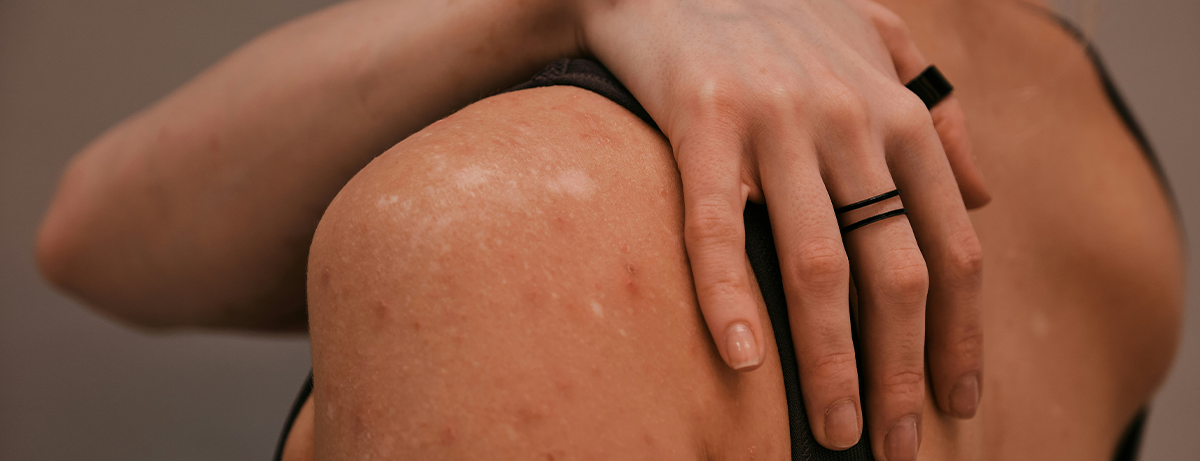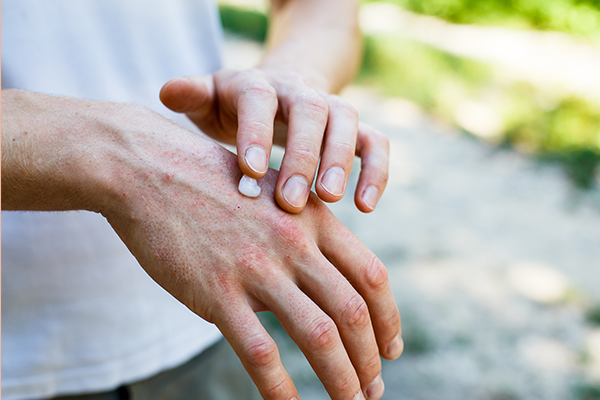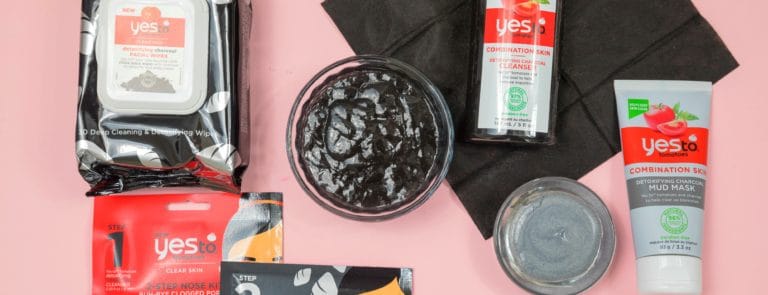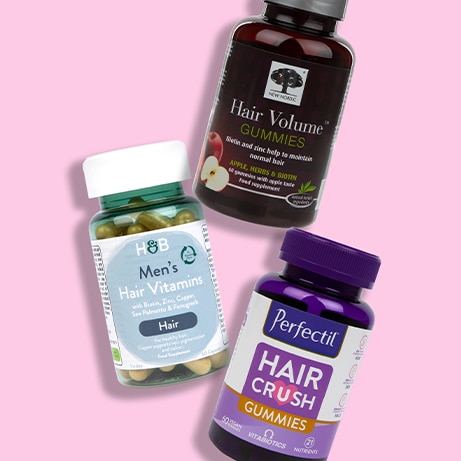15% off £25 or 20% off £35
Code:BASKET
Psoriasis: everything you need to know

Struggling with red, scaly skin? Uncover everything you need to know about psoriasis – from symptoms and triggers to expert-backed treatments – and take control of your skin with confidence
Summary
1What’s psoriasis?
Psoriasis is a long-term autoimmune condition that puts your skin’s cell production into overdrive…
2Types of psoriasis
Psoriasis comes in several distinct forms, each with its unique traits and characteristics…
3Psoriasis symptoms
Recognising psoriasis involves more than spotting a red patch. Psoriasis symptoms are a mixed bag that can vary from person to person…
Psoriasis might seem complicated, but it’s more manageable than you think.
Whether it’s your first encounter with scaly patches or a long-time challenge, understanding it doesn’t have to be overwhelming. With the right knowledge and strategies, you can tackle it head-on and keep your skin looking and feeling its best...
What is psoriasis?
Psoriasis is a long-term autoimmune condition that puts your skin’s cell production into overdrive.1
Instead of the typical month-long cycle of skin cell turnover, people with psoriasis experience a rapid regeneration process – sometimes in just days.2 This fast-paced turnover creates thick, scaly patches, often accompanied by redness and inflammation.1,2
While it commonly affects the elbows, knees, scalp and lower back, psoriasis can appear just about anywhere.2
Although psoriasis isn’t contagious, its visible nature may affect your confidence and mental health.3 However, with the right approach, you can take control and keep your skin feeling healthy.
The different types of psoriasis
Psoriasis comes in several distinct forms, each with its unique traits and characteristics:5
Plaque psoriasis is the classic and most common type, the one most people picture when they think of psoriasis.6
It appears as raised, red patches topped with silvery-white scales, which can be itchy or sore to the touch. These plaques vary in size, appearing as small patches or covering larger areas of skin.7
Notice tiny, teardrop-shaped sores on your skin? Guttate psoriasis might be the culprit.8
Often triggered by a respiratory tract infection, like strep throat, it’s more common in children and young adults.5 These little spots can dot your arms, legs, torso or even your scalp and usually clear up within 3–4 months.2,9
Inverse psoriasis likes to hang out in the folds of your skin – think under the breasts, around the groin or beneath the buttocks.10
Unlike plaque psoriasis, it doesn’t have scales, which can make it easy to confuse with other conditions, such as fungal infections. Instead, it appears as shiny, red patches that can worsen with sweat or friction.10
Pustular psoriasis is a rare but intense form of the condition.11 It’s characterised by yellowish pus-filled blisters that can look alarming, along with symptoms such as fever, chills and fatigue, making it feel more like an all-body event.5,11
You might see it in specific areas, such as your hands and feet, or across more extensive regions of your body.11
Erythrodermic psoriasis is psoriasis at its most severe. It causes widespread redness, peeling and intense itching.12
While it’s a rare form that affects around 1 - 2% of psoriasis patients, it’s a medical emergency. It can disrupt your body’s ability to regulate temperature and protect itself against infections, so immediate care is essential.12
Who can get psoriasis?
Psoriasis can affect anyone.5 That said, the following factors can increase your chances of developing it:1,2,7,13,14
- genetics: if psoriasis runs in your family, your odds might increase. While researchers have linked specific genes to the condition, carrying them doesn’t guarantee you’ll develop psoriasis
- age: while it can occur at any age, psoriasis commonly appears between the ages of 20 and 30. There’s also a second spike later in life, often around 50 to 60 years old
- lifestyle: stress, smoking and obesity can all trigger or worsen psoriasis. A poor diet and frequent alcohol consumption may also contribute to flare-ups
Psoriasis symptoms
Recognising psoriasis involves more than spotting a red patch. Psoriasis symptoms are a mixed bag that can vary from person to person. Here are some of the most common signs to look out for:1,5
- thick, scaly plaques with silvery scales that can feel itchy or sore
- red, inflamed skin surrounding the plaques, giving the affected areas a noticeable border
- cracked and bleeding skin, especially in dry areas, where the skin splits and becomes painful
- itching or burning sensations that can disrupt your day and interfere with sleep
- nail changes, such as pitting, discolouration or crumbling, which may be mistaken for fungal infections
- joint stiffness or swelling in cases of psoriatic arthritis, which can affect some people with psoriasis, leading to joint damage if left untreated
You can find images of psoriasis and how it looks on different skin tones on the NHS website.
For some, symptoms can be mild, with just a few small patches, while others may experience more severe, widespread effects.1 Recognising these signs is the first step toward managing psoriasis effectively.
What causes psoriasis?
The exact cause of psoriasis is a mystery, but researchers have uncovered clues about what may set it off.1 It’s believed to be a result of a combination of genetic and environmental factors that work together to spark those frustrating flare-ups.15
Here’s the lowdown:2,16,17
Here’s the lowdown:2,16,17
- immune system overactivity: psoriasis is thought to occur when the immune system mistakenly attacks healthy skin cells, accelerating their production. This leads to inflammation and characteristic scaling
- triggers: stress, infections and even minor skin injuries like cuts or sunburn can initiate or exacerbate flare-ups. Some medications, such as beta-blockers and lithium, may also nudge it into action
- environmental factors: winter can be especially tricky. Cold weather and dry air (thanks, indoor heating) tend to make symptoms worse
Researchers are still unravelling how these factors interact and why some people are more prone to psoriasis than others. However, understanding these triggers is a significant first step in keeping flare-ups at bay.
How’s psoriasis diagnosed?
Diagnosing psoriasis starts with a visit to your GP, who’ll closely examine your skin and ask questions about your symptoms. Here’s what to expect: 2
- physical examination: your doctor will look for the hallmark signs of psoriasis, such as red, scaly patches or nail changes
- medical history: they’ll likely ask about your family’s health history, lifestyle habits and any other factors that might trigger your symptoms
- skin biopsy: if there’s any uncertainty, a healthcare professional may take a small skin sample and examine it under a microscope to rule out other conditions like eczema or fungal infections
If joint pain is a concern, a doctor may recommend blood tests or imaging tests such as X-rays or magnetic resonance imaging (MRI) to check for psoriatic arthritis.18

Psoriasis treatment
While there’s no cure for psoriasis, many treatments can help manage flare-ups and make your skin feel more comfortable.5
Topical treatments are usually the first step in managing mild to moderate psoriasis.2 These creams and ointments work right where you need them, offering targeted relief.
Some common options include:2,19
- emollients: these moisturisers help lock in hydration, soothe dryness and soften rough patches, making other treatments more effective
- corticosteroids: these treatments can help calm inflammation and relieve itching. Available in various strengths, they’re designed to tackle anything from mild irritation to more stubborn patches
- vitamin D analogues: these little powerhouses slow down skin cell growth, making scales less noticeable. Calcipotriol and calcitriol are popular picks coal tar: a bit old-school but effective for some, coal tar may help reduce scaling and itching. It’s got a distinctive smell, but some do swear by it for relief
- salicylic acid: this ingredient helps soften and remove those pesky scales. Salicylic acid products work great alongside other treatments to boost their effectiveness
When your skin needs a little extra TLC, you could try ultraviolet (UV) light therapy.2
Phototherapy slows down skin cell growth through controlled exposure to UV light.2 Treatments like narrowband UVB and PUVA (psoralen combined with UVA) can work wonders, but they require careful medical supervision from a healthcare professional to prevent skin damage.20
Systemic treatments are the next step for severe psoriasis or when other treatments haven’t worked.5
These powerful options work throughout your entire body and fall into two main categories:2,20
- non-biological treatments: these oral medications tackle psoriasis by slowing down skin cell production or suppressing the immune system. Options like methotrexate, ciclosporin and acitretin can be effective but require regular monitoring due to potential side effects like liver issues or high blood pressure. They’re powerful tools, but need extra caution, especially for those planning to start a family
- biological treatments: delivered via injections, biologics target overactive immune cells to reduce inflammation. Medications like etanercept, adalimumab, infliximab and ustekinumab are precise and can be effective for severe cases, though they come with risks, such as infections. Regular check-ins with your doctor are crucial to ensure everything stays on track
Lifestyle changes can also make a significant difference. Managing stress, eating a balanced diet, and regular exercise can all pave the way for treatment success.2
What’s the difference between psoriasis and eczema?
Psoriasis and eczema can look alike at a glance, but they’re quite different. Here’s how you can tell them apart and understand their distinct characteristics:1,2,21,22
- appearance: psoriasis often looks like thick, scaly plaques with a silvery sheen that feels rough. Eczema, on the other hand, presents as red, inflamed patches that may ooze or crust
- location: psoriasis loves the spotlight on areas like your elbows, knees and scalp, while eczema prefers the cosy spots, like the folds behind your knees or inside your elbows
- triggers: stress, infections or certain medications can spark psoriasis, while allergens, irritants or environmental factors such as dry air often bring on eczema
- sensations: psoriasis may cause mild itching or even a burning sensation, whereas eczema is notorious for intense itching
- causes: psoriasis occurs when an overactive immune system speeds up skin cell production, resulting in scales. In contrast, eczema is linked to a weakened skin barrier, which makes your skin more vulnerable to irritants and allergens
The final say
Living with psoriasis can be challenging at times, but it doesn’t have to define you. You can manage flare-ups by recognising symptoms, pinpointing triggers and exploring treatment options.2 Remember, you’re not alone – support is available and treatments continue to improve.
Work with a healthcare professional to create a treatment plan that’s right for you. With proper care and knowledge, you can take control of psoriasis and embrace the confidence that comes with healthier, clearer skin.
Ready for more? Learn how to soothe dry skin in our ultimate guide.
Disclaimer - This article provides informational advice and is not a substitute for medical care. Curated by experts for accuracy, we take great care to ensure the information is up-to-date and relevant. However, you should always consult your GP or healthcare professional before using supplements or alternative products, particularly if you have medical conditions or are under supervision.
1. Nair PA, Badri T. Psoriasis. Treasure Island (FL): StatPearls Publishing; 2023. Available from: https://www.ncbi.nlm.nih.gov/books/NBK448194/
2. NHS. Psoriasis: Overview [Internet]. [cited 2024 Dec 18]. Available from: https://www.nhs.uk/conditions/psoriasis/
3. Jankowiak B, et al. Relationship between self-esteem and stigmatization in psoriasis patients. Postepy Dermatol Alergol. 2020;37(4):597–602. https://doi.org/10.5114/ada.2020.93242
4. Hedemann TL, Liu X, Kang CN, Husain MI. Associations between psoriasis and mental illness: an update for clinicians. General Hospital Psychiatry [Internet]. 2022 Mar-Apr [cited 2025 Sep 11]; 30-37. Available from: https://www.sciencedirect.com/science/article/abs/pii/S0163834322000056
5. National Institute of Arthritis and Musculoskeletal and Skin Diseases. Psoriasis [Internet]. [cited 2024 Dec 18]. Available from: https://www.niams.nih.gov/health-topics/psoriasis
6. Badri T, et al. Plaque psoriasis. Treasure Island (FL): StatPearls Publishing; 2023. Available from: https://www.ncbi.nlm.nih.gov/books/NBK430879/
7. Kimmel GW, Lebwohl M. Psoriasis: Overview and diagnosis. Evidence-Based Psoriasis. 2018;1–16. https://doi.org/10.1007/978-3-319-90107-7_1
8. Saleh D, Tanner LS. Guttate psoriasis. Treasure Island (FL): StatPearls Publishing; 2021. Available from: https://www.ncbi.nlm.nih.gov/books/NBK482498/
9. NICE. Psoriasis: Scenario: Guttate psoriasis [Internet]. [cited 2024 Dec 18]. Available from: https://cks.nice.org.uk/topics/psoriasis/management/guttate-psoriasis/
10. Micali G, et al. Inverse psoriasis: From diagnosis to current treatment options. Clin Cosmet Investig Dermatol. 2019;12(12):953–9. https://doi.org/10.2147/CCID.S189000
11. Shah M, et al. Pustular psoriasis. Treasure Island (FL): StatPearls Publishing; 2023. Available from: https://www.ncbi.nlm.nih.gov/books/NBK537002/
12. Singh RK, et al. Erythrodermic psoriasis: Pathophysiology and current treatment perspectives. Psoriasis (Auckl). 2016;6:93–104. https://doi.org/10.2147/PTT.S101232
13. Ogawa K, Okada Y. The current landscape of psoriasis genetics in 2020. J Dermatol Sci. 2020;99(1):2–8. https://doi.org/10.1016/j.jdermsci.2020.05.008
14. Michalski P, et al. A crossroads between dietary habits, alcohol consumption, and smoking in the clinical course of psoriasis: A narrative review. Postepy Dermatol Alergol. 2023;40(5):599–605. https://doi.org/10.5114/ada.2023.129308
15. NICE. Psoriasis: What factors may trigger an episode of psoriasis [Internet]? [cited 2024 Dec 18]. Available from: https://cks.nice.org.uk/topics/psoriasis/background-information/trigger-factors/
16. Balak D, Hajdarbegovic E. Drug-induced psoriasis: Clinical perspectives. Psoriasis (Auckl). 2017;7(7):87–94. https://doi.org/10.2147/PTT.S126727
17. Psoriasis Association. Tips for managing psoriasis in cold weather [Internet]. [cited 2024 Dec 18]. Available from: https://www.psoriasis-association.org.uk/news/cold-weather-tips
18. NHS. Psoriatic arthritis [Internet]. [cited 2024 Dec 18]. Available from: https://www.nhs.uk/conditions/psoriatic-arthritis/
19. British Association of Dermatologists. Psoriasis – topical treatments [Internet]. [cited 2024 Dec 18]. Available from: https://www.bad.org.uk/pils/psoriasis-topical-treatments/
20. NICE. Psoriasis: Assessment and management [Internet]. [cited 2024 Dec 18]. Available from: https://www.nice.org.uk/guidance/cg153/chapter/Recommendations
21. National Institute of Arthritis and Musculoskeletal and Skin Diseases. Atopic dermatitis [Internet]. [cited 2024 Dec 18]. Available from: https://www.niams.nih.gov/health-topics/atopic-dermatitis
22. Griffiths CEM, van de Kerkhof P, Czarnecka-Operacz M. Psoriasis and Atopic Dermatitis. Dermatology and Therapy [Internet]. 2017 Feb 1 [cited 2025 Sep 11]; 7: 31-41. Available from: https://link.springer.com/article/10.1007/s13555-016-0167-9



.png)








